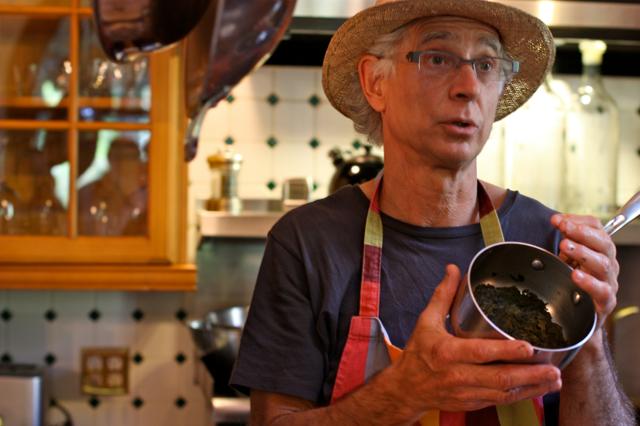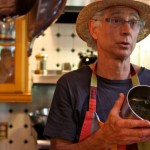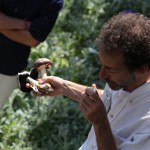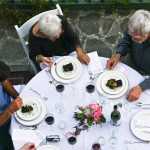- On your Mark: Mark Rosenstein gives a cooking demonstration in the kitchen of the Laughing Frog Estate. Photo by Kevin Gregory
- Get wild: Alan Muskat sniffs at some winecap mushrooms growing on the property of the Laughing Frog Estate. Photo by Alissa Whelan
- Locavore eats: Participants of the “No Taste Like Home” retreat enjoy a dinner of wild-harvested foods at the end of the day. Photo by Alissa Whelan
Alan Muskat is wearing pink Crocs. He’s standing in front of a group of people gathered in dappled sunlight on the lawn of the Laughing Frog Estate, a lush 200-plus-acre plot in between Hot Springs, Marshall and nowhere.
"I'm very honored and appreciative to have you all here," he says to the group, most of whom sip Champagne, recline in lawn chairs and seem equally appreciative. A violinist has set down his instrument so that everyone can hear what Muskat has to say. The spring breeze carries a scent of lilac and, faintly, the morels that Mark Rosenstein, the founder of The Market Place restaurant, cooking instructor and food blogger, is sautéing in the kitchen.
"There's so much that we have to share today," continues Muskat. "The beauty and the music and the food, all of the hidden things to eat, some of which I discovered walking in, the surprises that I'm going to share with you today. That's the beauty of foraging — you never know what you're going to find."
The group is gathered to take part in a retreat series that Muskat has named “No Taste Like Home.” This is the second installation of the monthly program, one part foraging expedition, one part pampering session. Each event features a trek through the property to learn about the edible gifts of the earth.
After the wild-foods walk, participants head back to the estate’s 7,000-square-foot mansion, a home that was recently featured in the Travel World International Magazine article, "A Lap of Luxury, Southern Style: Five Star Relaxation in America.”
There, they remove their muddy shoes, slip into something dinner-appropriate and, weather permitting, retire to the porch for a full-service multicourse meal of forest cuisine and foraged foods prepared by a local chef. This week, it's Rosenstein. Future chefs include Adam Bannasch of Zambra and William Dissen, the new chef and owner of The Market Place restaurant, among others.
If it sounds rather idealistic and hoity-toity, it may be that the price tag of the event — $125 — has encouraged the organizers to paint it that way. In actuality, that's (thankfully) not exactly the case.
Yes, we're greeted with Champagne. And yes, while the Laughing Frog is a first-class resort, it also manages to maintain a light crunchy vibe, despite the luxurious trappings of expensive antiques, a five-star kitchen and a tennis court.
And Muskat himself — a well-known mushroom gatherer, eater-of-insects and all-around eclectic local personality who's organized this series — ensures that things don't swivel too far into the realm of the sophisticated. As with foraging, you truly never know what you're going to find with this event.
One participant had the dubious honor of finding a live snake in a sack. To his credit, Muskat thought the critter was recently deceased when he put it in the paper bag that he left on the table (to save for proper burial, one would presume). At least one would hope it had nothing to do with dinner. It certainly wasn't Muskat's intention to scare the bejeezus out of his guests.
But the way Muskat recounts the story later makes me think he's impishly pleased with the incident. It's truly an Easter miracle how that thing came back to life, really. Or Passover, since that's the theme of the night's dinner, with its Carolina trout gefilte fish hors d'oeuvres and potato casserole, garnished with wild "air potatoes." Out of curiosity, I looked it up later and find that the air potato is a highly invasive wild vine from Africa — and it's highly recommended that you refrain from eating it. But this particular version, I later learn, is Dioscorea batata, which is edible. “I should be calling it ‘cinnamon vine,’ but air potato is a so much better name,” says Muskat, which goes to prove — once again — that you can’t believe everything you read online.
Anyway, mushrooms, not strange vines, are the main focus of the meal. And even though the air potatoes apparently should be our chief concern, fungus is what frightens people the most, according to our expert. "But you say 'wild foods' in general and people think that you're crazy and that you're going to kill yourself," says Muskat. Snarky comments from local reporters presumably don't help the cause.
But Muskat infers not-so-subtly that he's OK with wearing the crazy mantle. It's a rare entrepreneur that can succeed on a model based somewhat on an element of danger. Muskat is a little like the Appalachian version of the sushi chef who specializes in fugu — poisonous blowfish that will ensure an utter lack of repeat customers if prepared incorrectly.
"I have a very great niche, because everyone else is too afraid to do it," he says. The crowd giggles a bit. I can't tell yet if the majority of the people are naturally relaxed about the perceived danger of eating wild food, or if the Champagne is simply taking hold.
Don’t play fungus roulette
There are more than 30,000 types of mushrooms in the world, Muskat is saying. And out of those, only about a dozen are deadly. "That doesn't mean you go out and play fungus roulette," he says. In fact, he recommends not eating anything you don't recognize without proper guidance. Since most of us outgrew tasting unidentified objects on the ground after toddler-hood, it's likely that won't be a problem.
Mushrooming, says Muskat, is not a solitary pursuit. "Always ask someone else," he says. "There's a saying in Africa: the one who asks is the one who doesn't get poisoned by mushrooms."
Not sure whether or not we're being told a story (we likely are), we set off in rather large numbers to explore said natural world. And presumably — hopefully — eat wild things that won't kill us. (After all, I've promised my editor that I won't die today, or at least until my latest project is complete.)
But my untimely death doesn't seem as though it will be an issue. Most of the wild foods are already in the kitchen, and hopefully someone’s been sorting carefully. Muskat points out nettles, a stinging plant that Rosenstein’s already busily pureeing into a pesto back in the kitchen. Muskat doesn't make us harvest any — but he tells us how to do so, should we want to. If you're careful, he says, they won't sting you. Beekeepers often say the same thing about bees. The foragers maintain a respectful distance from the stinging herb by pretending to poke through the ferns on the opposite bank.
We find a clump of ramps, but it's treated more like an exhibit — it's only a small stand, and Rosenstein's got a wealth of that garlicky green slowly drying in the oven, or going into a ragout with fresh morels. I momentarily wonder if I might get away with shoving a few in my pockets while no one's looking, but I decide that a strong scent of onion emanating from my pants might give me away.
The rest of the group has already plowed ahead. They're eating violets like a bunch of rabbits and sampling young ferns — which Muskat describes as a bitter-tasting cousin to the fiddleheads that are precious commodities on the seasonal spring menu.
Then Muskat walks to a stand of daylilies, pulls a few, then takes a slice of the green tender part near the root and pops it in his mouth. "I have just tasted this, and it's OK," says Muskat with authority. "But I'm going to give it to my apprentice and if she's still alive in a few minutes, you all are welcome to eat what's left."
She is, and we do — it tastes like a cross between bamboo shoots and spring onion. In fact, later, Rosenstein will feed us the daylilies, sautéed with sliced bamboo shoots and served with ground and spiced venison.
While we're munching on flower stems, Muskat tells us that, earlier that day, he picked a ton of sochan, a wild green favored by the Cherokee that tastes like a cross between arugula, spearmint, spinach and lavender greens. His intention was to make them as a salad for us, he says, but we won't end up eating it. Why? "I decided that there might be one deadly plant in there, so I threw away the whole bunch," he says. "So … you all should be glad."
"Exciting!" someone (who may or may not have been this reporter) trills sarcastically. With that, we tromp back to the house for a cooking lesson by Rosenstein and a spread of hors d'oeuvres and wild blueberry wine sparklers plus dandelion wine that tastes surprisingly citrusy. There's mock chopped liver with honey mushrooms and black walnuts being passed around on trays and local eggs on the table, hard-boiled and "batiked" with blackberry juice. It's not Thomas Keller, but it's very good — and very wild.
Later, back out on the porch in the lilac-scented breeze, we're seated at tables, set with proper china and silver. Wild-food meals need not be eaten out of bear skulls and lily pads, apparently. In fact, it's all quite civilized. While I was expecting some sort of strangely intoxicating root liquor, the service staff opens a bottle of a deeply dark and fruity Shiraz, and sets it in the middle of each table for us to pass around, family-style. Given the sophisticated atmosphere of the porch, we've all (mostly) set aside our wild child for the evening, though one of the musicians has given up plucking his instrument and seems to be howling on the other end of the porch. I blame root liquor.
As the sun dips below the spring-green mountain ranges that frame our view, the service staff lights tea candles. The entire day has been immensely gorgeous if slightly, amusingly strange. But this? The porch scene in candlelight, tables set with edible wildflowers and asparagus shoots, this belongs in the pages of Southern Living. The wine and the courses flow, as does the conversation.
And not a one of us flinches — or gets poisoned — when the sochan salad arrives.
Visit the No Taste Like Home website for more information: notastelikehome.org
— Mackensy Lunsford can be reached at food@mountainx.com.







Stdans back from the keyboard in amazement! Thanks!